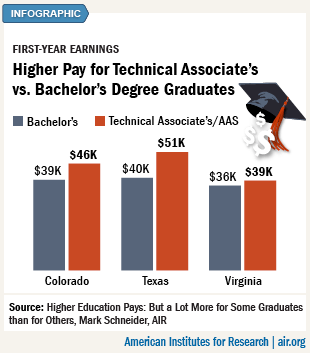When It Comes to Your Pay, What You Study in College Is More Important than Where You Go To School, New Analysis Finds
Washington, D.C. – An analysis of the earnings of recent college graduates in five states finds that those who went to elite institutions do not necessarily earn higher salaries than their peers, that some certificate and associate degrees are far more lucrative than four year degrees, and that when it comes to science, technology, engineering and math (STEM), students who study biology or chemistry will earn far less than those in the other three fields.
Higher Education Pays: But a Lot More for Some Graduates than for Others was written by Dr. Mark Schneider, the president of College Measures, with funding provided by the Lumina Foundation. The report examines the average first-year earnings of graduates from two-year and four-year institutions in Arkansas, Colorado, Tennessee, Texas and Virginia and compares it with the degrees they earned.
“The findings challenge some conventional wisdom, showing for example that what you study matters more than where you study,” says Schneider, a vice president and Institute Fellow at the American Institutes for Research (AIR). “Higher education is one of the most important investments people make. The right choices can lead to good careers and good wages while the wrong ones can leave graduates with mountains of debt and poor prospects for ever paying off student loans.”
 College Measures, a joint venture of AIR and the Matrix Knowledge Group, partnered with five states to make information available about how much college graduates earn. Four lessons emerged from analyses:
College Measures, a joint venture of AIR and the Matrix Knowledge Group, partnered with five states to make information available about how much college graduates earn. Four lessons emerged from analyses:
- Some short-term credentials, including associate’s degrees and occupational credentials, are worth as much or more than long-term ones. In Texas, individuals with technical associate’s degrees earned on average over $11,000 more after graduation than did those with bachelor’s degrees. In Colorado, graduates with associate degrees in Applied Sciences out-earned their counterparts with bachelor’s degrees by more than $7,000 and in Virginia by more than $2,000.
- Where you study has an impact on earning—but less than you may think. The earnings of graduates from a significant proportion of schools within each state are roughly identical. Graduates from flagship campuses who go straight into the labor market, on average, do not earn more than graduates from many of the regional campuses.
- What you study matters more than where you study. When it comes to associate’s, bachelor’s and master’s degrees, the labor market rewards technical and occupational degree skills. Graduates with engineering degrees earned the most in every state. Graduates with degrees in health-related fields, especially nursing, are among the highest paid and are usually followed by graduates with business degrees. Graduates with bachelor’s degrees in music, photography, philosophy, and other liberal arts almost always earn the least among the major fields of study.
- The S in STEM (Science, Technology, Engineering, and Mathematics) is oversold. Despite the clamoring for more students to focus on STEM, the labor market shows less demand for science skills. Employers are paying more, often far more, for graduates with degrees in technology, engineering and math. There is no evidence that biology or chemistry majors earn a premium wage, compared with engineers, computer/information science or math majors. The labor market returns for science are similar to those of the liberal arts, like English language and literature.
The full report is available at www.air.org.
About College Measures
Established in 2011, College Measures is committed to informing and improving the decision-making process for students, parents, and policy makers and in so doing, help create a more efficient, productive and effective higher education system. For more information, visit College Measures.
About AIR
Established in 1946, with headquarters in Washington, D.C., the American Institutes for Research (AIR) is a nonpartisan, not-for-profit organization that conducts behavioral and social science research and delivers technical assistance both domestically and internationally in the areas of health, education, and workforce productivity. For more information, visit www.air.org.
###